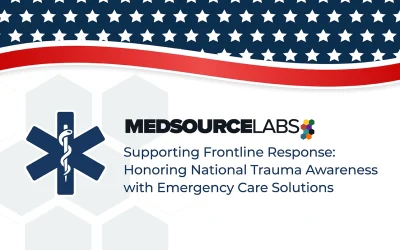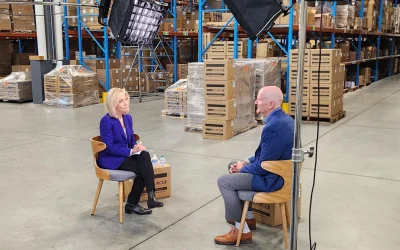When the global pandemic swiftly spread around the world in late 2019 and early 2020, it exposed the fragility of the global supply chain system within a few short weeks. The disruptions of critical medical supplies, raw materials and other vital components became acute as hospitals scrambled for PPE and other vital medical products. The limited supply and demand for many goods outside the U.S. borders escalated further as consumer behavior changed. This was compounded by labor shortages at U.S. ports and across the globe.
These transportation delays—combined with shipping container shortages, caused major disruptions, and fueled significant spikes in cost. No industry has been immune to these supply chain shocks, which have rippled down to consumers and patients. Furthermore, the inflation surge and its knock-on effect on the prices of critical medical products is now one of our primary concerns in 2022.
At MedSource Labs, we recognized these dependency issues long before the onset of the global pandemic, particularly when tariffs were applied to Chinese imports in 2018. At that time, we made a strategic decision to diversify our resources and make key investments in different geographic regions across the globe.
Focus on EMERGE: Expanding Global Footprint
At the crux of the matter for MedSource Labs is our EMERGE process, a highly collaborative service in which we work closely with key customers to identify and develop cutting-edge medical products – bringing them to market rapidly and efficiently. EMERGE offers a customizable suite of services, offering expertise in regulatory and compliance submissions, product conception, design and sourcing materials, optimization, and marketing strategy. These processes involve working with key suppliers across the globe that maintain the highest quality standards and practices and meet our NxtMedTM Vendor Code of Ethics.1
While the supply chain disruptions have shown the difficulties in gaining access to even the most basic raw materials or components, we maintained our customer needs by building new partnerships across the globe – relationship building has always been MedSource Labs’ core strength.
In line with this, we have solidified agreements with major suppliers in Colombia, India, and Italy. As transportation delays continue to be a major problem, we will now be able to move products from South America to the U.S. in much less time and with reduced shipping costs. We are satisfied with our long-term partnerships in China – some of which date back nearly twenty years. But we also understand the geopolitical and business risks to our company and the potential exposure to our customers. Therefore, expanding our vendor and supplier partnerships across geographic regions supports our long-term vitality and success.
Another issue with the supply chain bottleneck is limited warehouse space. As a result, MedSource Labs has invested in expanding our warehouse capacity in strategic locations on both the East and West Coasts.
Lending Our Voice on Key Policy Issues
At MedSource Labs, we understand that engaging directly with key stakeholders has a profoundly beneficial impact on the MedTech industry. We have been on the frontlines since the pandemic first hit – because it was vital for federal lawmakers and key government agencies to understand firsthand the importance of prioritizing key medical supplies to hospitals and first responders.
In November 2021, MedSource Labs joined a pilot program (made possible by AdvaMed, the White House, Department of Transportation, and the Federal Maritime Commission) that collaborates with the Los Angeles and Long Beach ports – as well as terminal operators – to test tools and streamline processes for prioritizing shipping containers carrying medical supplies. MedSource Labs’ logistics team regularly provides data and information regarding conditions on the ground to help policymakers ensure the ports are doing all they can to relieve the logjam. We are also engaged with FEMA (through direct conversations and a signed Voluntary Agreement) to provide timely information on the impact supply chain bottlenecks are having on the medical device industry.
The good news is that while there remains a significant backlog of vessels to work through, there has been some progress – namely one-to-two-week time savings. Going forward, MedSource Labs will participate in future initiatives by the administration to tackle ports’ congestion and prioritize medical products for the benefit of our customers, serving as a resource to keep policymakers up to date on real-time developments to guide critical decisions and policies.
Higher Prices in Short & Medium-Term; Ocean Carriers Part of Problem
Record price increases continue to be a persistent and troubling feature of the current environment. At the January 2022 meeting of the Federal Reserve’s Federal Open Market Committee, central bank officials noted that “supply and demand imbalances related to the pandemic and the reopening of the economy have continued to contribute to elevated levels of inflation.”
The Institute for Supply Management’s January report on manufacturing activity showed that prices paid by manufacturers jumped compared to December, suggesting that costs could remain high for a while.
Sky-high freight rates are part of the kindling fueling this inflation fire. These price increases have spread to a broader range of goods and services, and the medical technology sector has been no exception. Unfortunately, the ongoing container shortage and port congestion means we should expect higher prices for the foreseeable future.
Concentration in the shipping industry has also allowed ocean carriers to continue charging up to ten times the standard spot rate for a container to the U.S. from Asia, including surcharges and premiums. Ocean shipping rates are expected to remain elevated well into 2024, meaning another year of record profits for global cargo carriers at the expense of companies like MedSource Labs and our customers.
High inflation imposes significant hardship, and MedSource will play its part in drawing policymakers’ attention to the spike in costs that our customers are experiencing and push for action. We do not want a world where shippers charging ‘FAK+ premium rates’ becomes the permanent state of affairs.
In February, MedSource Labs CEO Todd Fagley joined U.S. Senator Klobuchar and other business leaders in a media roundtable panel on supply chain challenges. The focus was predominately on bipartisan legislation introduced by Klobuchar and U.S. Senator John Thune that would create greater accountability for the ocean carriers.
This sentiment was echoed in a press briefing where President Biden announced that the Federal Maritime Commission with support from the U.S. Department of Justice will be paying increased attention to the global shipping industry to address unfair fees that are being charged to American businesses. The President is also calling on Congress to pass reforms that will address the antitrust immunity that has been afforded to ocean carrier companies for so long.
“I’m a capitalist, but capitalism without competition isn’t capitalism… When corporations don’t have to compete, their profits go up, your prices go up, and small businesses and family farmers and ranchers go under. We see it happening with ocean carriers moving goods in and out of America. During the pandemic, these foreign-owned companies raised prices by as much as 1,000% and made record profits.”
– President Biden, State of the Union, March 2022
Many industries are suffering from these outlandish costs.
Health Care Resilience Summary – at-a-Glance
Our Health Care Resilience strategy aims to protect us and our customers to ensure better patient outcomes should there be another “black swan” event. Events like COVID-19 can create a supply chain ripple effect within our business and industry. Unlike some other medical device manufacturers, we participate in the “full supply chain,” which includes relationships with raw material suppliers. If these relationships are disrupted in any way, it can have an adverse impact on patient outcomes. To mitigate the risks associated with unforeseen events, we have taken the following actions:
- Validation of multiple suppliers to ensure quality standards
- Diversifying suppliers to remain flexible with the “push, pull, shift” of availability of resources
- Limit costs associated with shipping while minimizing our carbon footprint
- Save time to ensure our stock is plentiful
The Healthcare Resilience Plan ensures that we have the necessary bandwidth to sustain the EMERGE process, created in response to customer needs when manufacturing life-changing medical devices.
Dave Kunelius serves as President of MedSource Labs. Jim Noble serves as Chief Operating Officer at MedSource Labs. They both have a combined experience of nearly 50 years of global experience in developing and leading effective operational strategies of small to medium sized manufacturing enterprises.


